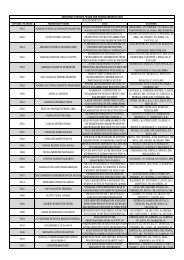immunology of infectious and parasitic diseases - XXXVII Congress ...
immunology of infectious and parasitic diseases - XXXVII Congress ...
immunology of infectious and parasitic diseases - XXXVII Congress ...
You also want an ePaper? Increase the reach of your titles
YUMPU automatically turns print PDFs into web optimized ePapers that Google loves.
DOWN-REGULATION OF IFN-g RECEPTOR ALPHA CHAIN EXPRESSION<br />
AND CXCL-10 PRODUCTION BY CYSTOISOSPORA BELLI ANTIGENS<br />
FERNANDA GONÇALVES GARCIA (1) ; MÁRCIA BENEDITA DE OLIVEIRA<br />
SILVA (1) ; ANA CRISTINA LOPES TOSTA (1) ; DALMO CORREIA FILHO (1) ;<br />
DAVID NASCIMENTO SILVA TEIXEIRA (1) .<br />
(1) Universidade Federal do Triângulo Mineiro, UFTM, Uberaba, MG, Brasil.<br />
Introduction: Extraintestinal cystoisosporosis has already been reported in<br />
HIV/AIDS patients, generally involving preferential invasion <strong>of</strong> mesenteric <strong>and</strong><br />
tracheobronchial lymph nodes, liver <strong>and</strong> spleen by unizoic cysts <strong>of</strong> this parasite,<br />
which may infect macrophages. It has been proposed that macrophages may<br />
act as C. belli host cells in extraintestinal sites. However, the absence <strong>of</strong> an in<br />
vivo experimental model has hampered the knowledge <strong>of</strong> parasite‟s biology.<br />
Moreover, until present, there is no information about chemokine <strong>and</strong> cytokine<br />
pr<strong>of</strong>ile secreted by PBMCs in response to C. belli antigens.<br />
Methods <strong>and</strong> Results: PBMCs were isolated from healthy volunteers <strong>and</strong><br />
stimulated with C. belli oocysts/sporozoites antigens. Cytokines in culture<br />
supernatants were quantifyed by ELISA. The cell surface expression <strong>of</strong> IFN-g<br />
receptor α-chain (CD119) was assessed by staining PBMCs with anti-CD119phycoerythrin<br />
(PE) monoclonal antibody <strong>and</strong> analyzed with a FACSCalibur flow<br />
cytometer using CellQuest s<strong>of</strong>tware (BD Biosciences). This study was approved<br />
by UFTM Research Ethical Committee. We demonstrate that C. belli antigens<br />
markedly inhibited CXCL-10 production (403,7 pg/ml) by PBMCs when<br />
compared to non stimulated cells (1030,0 pg/ml) (p=0,0093) without affecting IL-<br />
12p40 <strong>and</strong> IFN-g secretion (p>0,05). Since, CXCL-10 is an IFN-g inducible<br />
chemokine; we also analyzed the IFN-g receptor α-chain expression on CD14+<br />
positive PBMCs. Results obtained showed that PBMCs stimulation with C. belli<br />
antigens decreased CD119 expression.<br />
Conclusion: Since IFN-g activates effector mechanisms against intracellular<br />
pathogens, the impaired IFN-g response (reduction <strong>of</strong> CXCL-10 production <strong>and</strong><br />
CD119 expression) in cells stimulated by C. belli antigens may contributes to<br />
survival <strong>of</strong> this pathogen inside host cells. Investigation <strong>of</strong> mechanisms involved<br />
on IFN-g signaling inhibition by C. belli antigens may contribute for increase the<br />
knowledge about C. belli evasion strategies. The results obtained on the<br />
present work may improve the underst<strong>and</strong>ing <strong>of</strong> immunological events involved<br />
on C. belli/hosts cells interactions.<br />
Financial support: UFTM;CAPES/REUNI;FAPEMIG.



